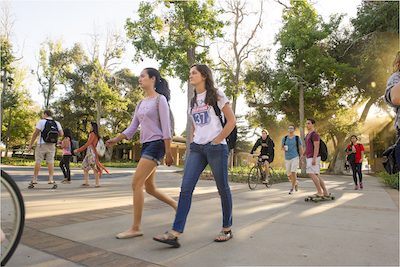Tip of the Month: Planning those summer visits to colleges
July 19, 2023
As Admission Officers, we are often asked to identify the best time to visit a college. There are two answers to this question. The first answer is to see the campus when everything is in its usual flow because this allows the guest to see people interacting, to stop someone in the dining hall, dorm, or outside a classroom, and ask questions. It also is the time when the admission office has the greatest number of resources to offer the guest, so it is an attractive time for us. The second answer is more informed by the realities of life as a junior or senior in high school: visit on a weekday that fits into your schedule. For many (most?) people, the summer is the best time.
What can you glean from your visit even if classes are not in session (or are at a low ebb), and only a fraction of the usual inhabitants are on campus? Plenty!
It takes more effort on your part, but you can discover important aspects of the atmosphere of the college, the culture if you will. The point is for you to anticipate what the experience might be like for you to live there.
First, investigate the academic atmosphere, and by this I mean the actual teaching. Go beyond the statistical points of student-to-faculty ratios and average class sizes. Those are merely symbols. Even if you are only able to see a barrage of empty classrooms ask the tour guides to describe the size of each class they have taken, and whether or not that is typical.
- Ask the tour guides what their classes are like.
- Who actually does the teaching? Make sure to ask them to answer this from the perspective of a lecture class, but also for the typical lab section or a recitation group.
- Look in the catalog for information about how decisions of faculty appointment, retention and tenure are made! If the school cares about teaching you, would not teaching be the first criterion?
- Are the labs and workshops well equipped? Who has access to them and how often?
- Ask about the level of academic intensity during the semester. In other words, how intellectually oriented are the students?
- Many schools place on the interior walls of academic buildings various posters of research or laboratory activity. After the tour, see if you can return to the academic buildings (if they are not locked) to read the research posters- or take a photo to read later. It may be interesting to note who is listed as the leading investigator (a student or a professor?) and whether post-docs or grad students are more commonly involved rather than college sophomores or juniors.
- If you see a person in the academic buildings in the summer, ask what their role is in summer. If you are able to enter the building*, seek them out and ask them questions about their experiences.
College should help you develop intellectually, but it is also a time to grow as a person. Ask yourself some questions before you start your tours so that you have some sense of what kind of residential environment might suit you. For example, is it important to you (or to the college) to support the arts? Do the students care about social or political issues? Is there a range of participation in athletics? Is the distance or proximity to a city something that affects the kinds of cohesion on campus? Are there certain activities or traditions that are unusual or popular (or both!)? Ask the tour guides about social “outliers” and what they do for fun and companionship. Since it is summer, where do the guides eat? What do they do for fun since (one imagines) few of their fellow students are on campus?
Invariably, the guides will want to show you the newest and most impressive facilities and buildings. Maybe it would be nice to know about (or make note of) the buildings that are not recently renovated. Find out which buildings are used most.
Some things NOT to pay too much attention to: 1) the weather! Summer weather, for good or bad, is almost never the weather that you will encounter when classes are in session**. Oh, don’t get me started on the many examples I could give on this point! 2) The relative emptiness of the campus. It may be normal for the campus to look like a shell of empty buildings in summer. There may be a lot of construction going on – summer is the best time to do this!
If you have time, attend the information session as well as the tour. Try to pick up hints about what the college values in its applicants (beyond the courses and grades) and pay attention how the selection process is organized. If you are successful in discerning these things, make notes to yourself for later use: key things to compose in your application that match that particular college’s values.
Finally, heed the advice of my colleague John Young of Hobart William Smith College (NY). Think of your visit as a bell curve with two tails of the distribution. Take what you like most and like least and remove them. What you are left with will probably be sustaining for the experience over the whole college career.